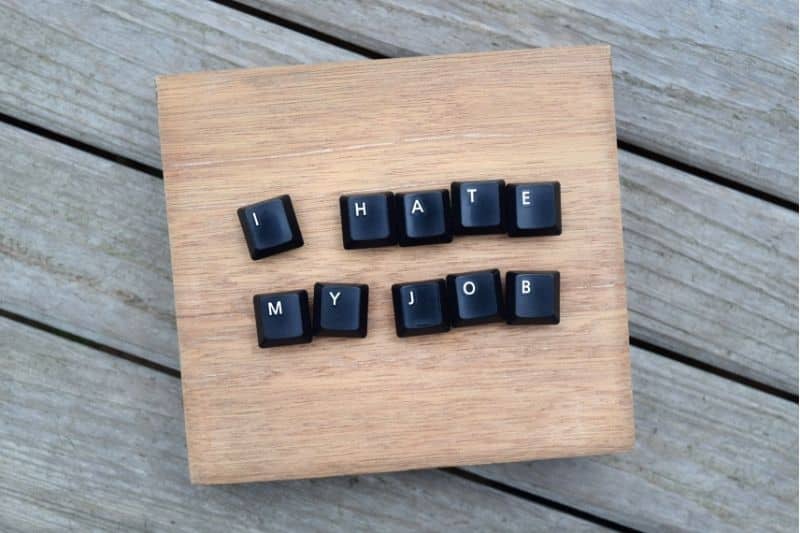Do you dread waking up every day and showing up to work? Do you want to know what to do when you hate your job or better yet how to quit a job you hate? There could be a variety of reasons you hate your job.

For instance, maybe you have a toxic boss, your boss is too demanding or you just are uninspired by the work you do. With many people working 40 hours or more a week, it’s dreadful to have to spend that much time in an environment you hate.
It can also be detrimental to your career in the long term. And there are massive psychological effects of hating your job, including physical and mental ailments like insomnia and depression.
Doesn’t sound great, does it? Unfortunately, not all of us can afford to quit our jobs right away. Find out what to do when you hate your job and our tips for hanging in there until you can quit.
Signs you hate your job
No job is perfect. There are things you might dislike about your day-to-day job. As a freelance writer, I dread having to deal with taxes and administration work every quarter.
But how can you tell when dreading your job is really a sign that you hate your job? Here are a few signs you hate your job:
You get anxious at the end of the weekend
We all get the Monday blues but if you spend your Sunday evenings anxious and upset thinking about the start of the workweek, chances are there is something more to it than the dread of Monday. One of the most obvious signs you hate your job is if you agonize over the thought of having to go back to work.
Your productivity and focus have decreased
If you’re unhappy at your job you might find yourself taking longer to complete tasks than you used to. This could also be due to outside factors, such as a noisy workplace or unpleasant colleagues. You may also find it difficult to focus if you’re dissatisfied with your job.
You’re constantly stressed
One of the biggest signs you hate your job is being stressed all the time. It’s a side effect of being in an environment you hate. It could do with the amount of work you are being asked to do or from working in a toxic workplace.
Psychological effects of hating your job
If you work at a job you hate you could experience psychological effects and be dissatisfied with life. Around 40% of the U.S. population is unhappy at work, so remember that you’re not alone. There are many others who are also experiencing the same things as you.
If you stay at a job you hate for too long, it could affect your mental health. Here are some of the psychological effects of hating your job:
Stress
When you work in an environment you don’t like, you may feel the need to hide your negative feelings. That can put added stress on yourself. Too much stress can have a negative impact on your overall health.
You might start to feel irritable, feel less focused, and unable to concentrate on your job. Chronic stress can even lead to physical ailments like headaches, nausea, and general pains.
Insomnia
If you are always worried about work and going to work the next day, that could have an impact on your ability to sleep. You could also end up having work-related nightmares, leaving you disoriented and restless the next day.
Anxiety
A toxic work environment could lead to a lot of worry and fear about your day-to-day situation. You might find yourself constantly worried or overreacting to situations. Anxiety can even lead to you being jittery.
Your heartbeat might race even when you’re sitting down and can even lead to anxiety and panic attacks. Anxiety is one of the most damaging psychological effects of hating your job.
What to do when you hate your job
If you find yourself in a job you hate, then it’s important to take steps to remedy the situation. While quitting your job is the quickest fix, it might not be possible right away. Here are some suggestions for what to do when you hate your job.
1. Set small, daily goals
It can be difficult to stay motivated throughout the day if you really dislike your job. One way to overcome that is to focus on the small things. Choose just one or two small things to focus on each day. You can make those goals as personal as you want and even connect them to your broader goals.
2. Find a work friend
Spending time with people we get along with can make even the most boring of jobs bearable. If you don’t already, find a work friend. Someone who you can check in with. Grab coffee or have lunch with them.
Being social is not only good for your mental health, but it will also make your workday much more enjoyable.
3. Decorate your work desk if you can
The space I work in is really important to me. If you work in a cubicle and are able to, bring some things to remind you of the things you love. That can be photos of loved ones, a plant, or art. I fill my desk with artwork from my friends, as it gives me joy to look at art made by people I know.
4. Take a break
We all need to get away from the mundane. Try switching up your routine. Go for a walk during a Zoom meeting, or take an extended lunch break.
You can also check with your boss or HR manager about changing your desk. You might not have a new job but changing your location can help make things bearable until you’re able to quit a job you hate.
5. Talk to HR
If you’re unhappy at work because of the people around you, then talk to the HR department. If you have a colleague that is creating problems and is toxic, chances are HR will want to know.
There is no need for you to be silent about a stressful or harmful situation. Many large companies even have policies in place to report things confidently.
6. Set boundaries with your colleagues
Do you get constant emails or messages from colleagues who expect you to drop everything and solve their work issues? Set clear boundaries with them. Set up a process so they know how to get the information across to you without calling you at 10 PM.
And make sure to be strict about those boundaries. Turn off your email and Slack notifications. Or better yet, delete them from your phone during the weekend.
7. Practice mindfulness and gratitude
One thing to do when you hate your job is to practice mindfulness and gratitude. Being present even for ten minutes a day can have a huge impact on your health and general well-being.
Spend some time in the morning before you arrive at work to be in the present. And if you have an especially bad day, take a break and focus on your breathing. A job is just a job and it doesn’t need to define you.
8. Do some self-reflection
Think about why you don’t like your job. Ask yourself specific questions about why you are showing signs of hating your job.
Some of the questions you can ask are whether the reason you hate your job has to do with your and not the job. In other words, are you bored? Is there something happening in your personal life? Have you lost interest in your career?
9. Don’t stop doing your best work
It’s easy to slack off if you don’t love your job. But even if you hate your job, you should still do your best work. Being mediocre will only make things worse and could hurt your long-term career success.
Instead, keep doing your best even when you don’t enjoy what you’re doing. It can help you feel better about the situation and help you grow.
10. Stay positive to improve your morale
Low morale is one thing that can cause you to be unhappy at your job. One of the things you can do when you hate your job is to try and stay positive.
Positivity is a powerful thing. By focusing on the good to get through difficult times, you can become a much happier person. It might not fix your work problems, but it can make things easier to cope with until you’re able to find a better job.
11. Vent to a trusted friend, career coach, or therapist
While you should keep any negative thoughts about your job off of social media, it doesn’t mean you can’t vent about it in private to those you trust.
Sometimes talking about all over complaints and annoyances can help you feel better. While venting won’t fix your frustrations, it can help reduce your stress and anger. But make sure to vent in moderation. Too much venting can actually increase your chronic stress.
Expert tip: Set goals, stay positive
If you have a job you hate but you can’t quit yet, set small goals, stay positive, and seek support from trusted friends or experts to make your experience more bearable.
How to quit a job you hate
If you hate your job, it’s time to do something about it. Even if your boss is giving you signs that they want you to stay, leaving might be best for you. Before you quit your job though, it’s important to have a plan besides just knowing what to do when you hate your job. So, let’s dive into how to quit a job you hate!
Step 1. Update your resume
When was the last time you updated your resume? Make sure your resume is top-notch. Add any work-related skills you acquired at your current job. Triple-check and then check again for any grammar or spelling mistakes. You don’t want a simple typo to be the reason your resume was skipped.
Step 2. Save money
If you quit your job before you have another one lined up, it’s important to save some money. Or maybe you need a break and want to take some time off before your next career move.
Either way, make sure you have an emergency fund and three to six months of living expenses saved up before you quit. That way you can take your time finding a job you truly enjoy.
Step 3. Apply to new jobs
The smartest way how to quit a job you hate is to have another one lined up. Check job boards like Linkedin and Indeed for openings in your area or network with friends and family. You can even ask for recommendations or job leads from former colleagues.
A lot of companies are open to remote job positions. So don’t let location hold you back during your job search. Be sure to check out our completely free course “How to Find a Higher Paying Job!”
Step 4. Inform your employer
Whether you have another job offer or just want to take some time off, you need to let your employer know that you are quitting. First, check your work contract to find out if there is a minimum notice period. For most employees in the U.S., the notice period is two weeks.
So if you can, try to tell your boss in person or on a video call. Keep the tone as positive as possible. There’s no need to tell your boss you dislike working for them.
You may need to ask them to write letters of recommendation or confirm your employment details later. You’ll need to follow up with a resignation letter and send a copy to your boss and the HR department.
Step 5. Say goodbye to your colleagues
Let your colleagues know that you are leaving and tell them goodbye. Send individual emails if you can to let them know you enjoyed working with them. If you worked with a difficult toxic coworker there is no need to send them a personal email but you should try to leave on as good a note as possible.
Is it OK to quit your job if you hate it?
Yes, it’s perfectly okay to quit your job if you hate it. Before you do, make sure quitting is the best option. It’s best to find another job before you quit to ensure financial stability. In some cases though, like a toxic work environment, quitting might be the best option for your mental health.
What are the signs of hating your job?
Some of the signs of hating your job include: dreading going to work on Mondays, disliking your boss, working on autopilot, finding excuses to avoid going to work or work-related events, having negative thoughts about your company or colleagues, your work quality is decreasing, and feeling undervalued or burnt out.
How do I get over hating my job?
If you hate your job and want to get over it, you can try to practice mindfulness and consider the positive aspects of your job. Identify specific goals and celebrate your small achievements. Try to use the opportunity to improve your skillset. Make sure to set boundaries about your work/life balance.
Related articles
Enjoyed this article on “what to do if you hate your job”? Well, check out this other related content!
Be savvy and survive a job you hate until you can quit!
Knowing what to do when you hate your job can make things much easier to bear until you’re able to quit.
Find a way to change up your routine, find work friends, and practice mindfulness. And with some planning and patience, you can quit your job and find a better opportunity.
However, remember to always remain professional and leave on good terms so you will be able to use this job as a reference for the future if needed!











